Acts - Chapter 8
There are many lessons a Christian can learn from studying chapter 8 of Acts as we are introduced to Saul who later became the Apostle Paul - his beginnings in how he persecuted Christians. We will learn about Philip the deacon - turned evangelist - as he ministered to the Samaritans, and how his obedience to the Lord brought many to Christ.
The Book of Acts - Chapter 8
Who Was Saul?

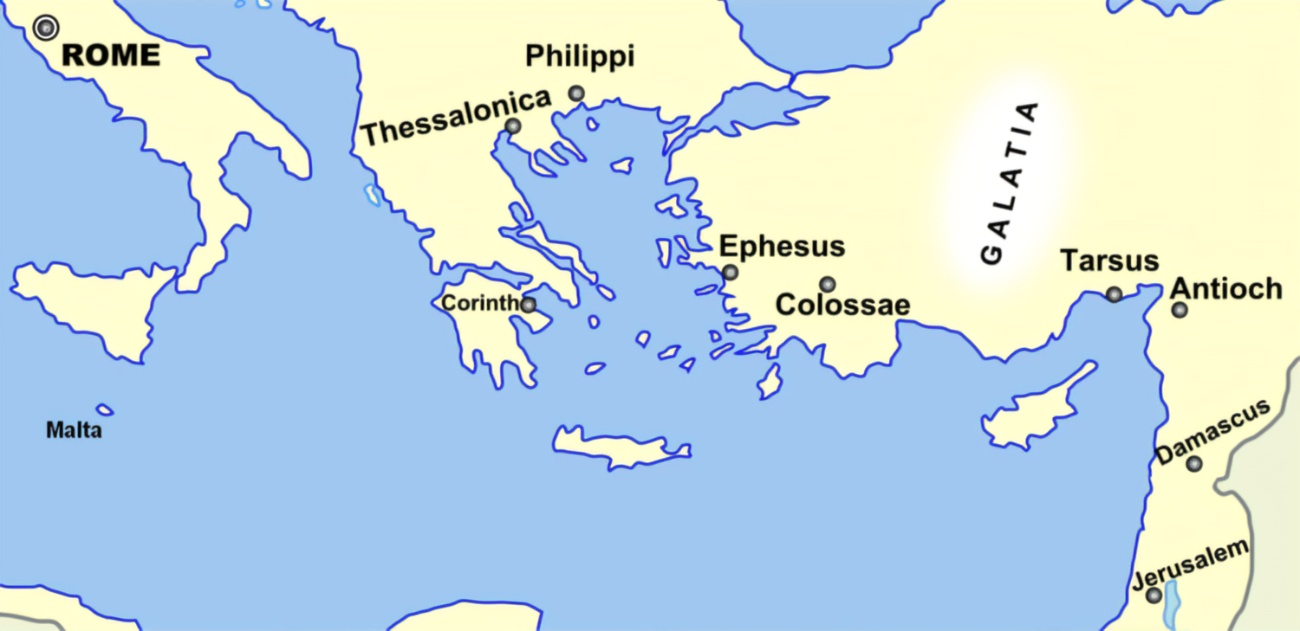 Tarsus was 590 miles from Jerusalem
Tarsus was 590 miles from Jerusalem
Saul of was born in 10 A.D. to a Roman father and a Jewish mother in Tarsus, an ancient city located on the Tarsus River about 12 miles from the Mediterranean Sea coast, in what we know of as Turkey today. Tarsus, a capital city, was a cultural and intellectual center, filled with pagan worship and debauchery.
Saul, who later became known as Paul probably came from wealth because after the age of fourteen he traveled to Jerusalem to become a talmadin (disciple/protege'/student) of the great Gamaliel, who was the grandson of the famous Hilliel, who was the greatest Pharisee of his day.
Who Was Gamaliel
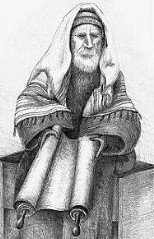
Gamaliel as a "master" rabbi was given the title of rabbin instead of rabbi. He too was a top Pharisee of his day, being a member of the ruling Sanhedrin Council in Jerusalem, carrying a lot of weight among the Jewish educators and aristocrats of society.
______________________________
The usual upbringing of a Jewish boy was from the age of five to fourteen he went to the local synagogue to be educated by a local rabbi. Most boys at the point learned the trade of their fathers; however, if a boy was unusually bright and wanted to extend his education, providing his family had the financial means, he would then seek out a rabbi to be trained under, with hopes of becoming a rabbi himself someday. The boy would leave his home and literally follow his rabbi wherever he went, becoming his talmadin. He learned to think and imitate his rabbi in every respect. At the age of thirty, this boy, now a mature religious man could enter into the ministry.
The year was now 36 A.D., and Saul was given the responsibility of overseeing the stoning of Stephen. It was probably one of those assignments that nobody within the Sanhedrin Council wanted to oversee, so they passed that assignment off to someone with less authority. Saul was only 26 years old at this time, and no Jewish man could enter into the ministry until the age of 30. That would tell us that Saul was still under the training of Gamaliel his rabbi and probably did the dirty work that the council members did not want to perform. He probably was an eager, wanting to get ahead trainee, desiring to please those over him. And now, he was given the task of overseeing a stoning, of which Saul carried out in great detail.
Let's now open Acts, chapter 8, starting in verse 1.
Persecution Within the Church
Acts 8:1 Now Saul was consenting to his death. At that time a great persecution arose against the church which was at Jerusalem; and they were all scattered throughout the regions of Judea and Samaria, except the apostles. 2 And devout men carried Stephen to his burial, and made great lamentation over him.
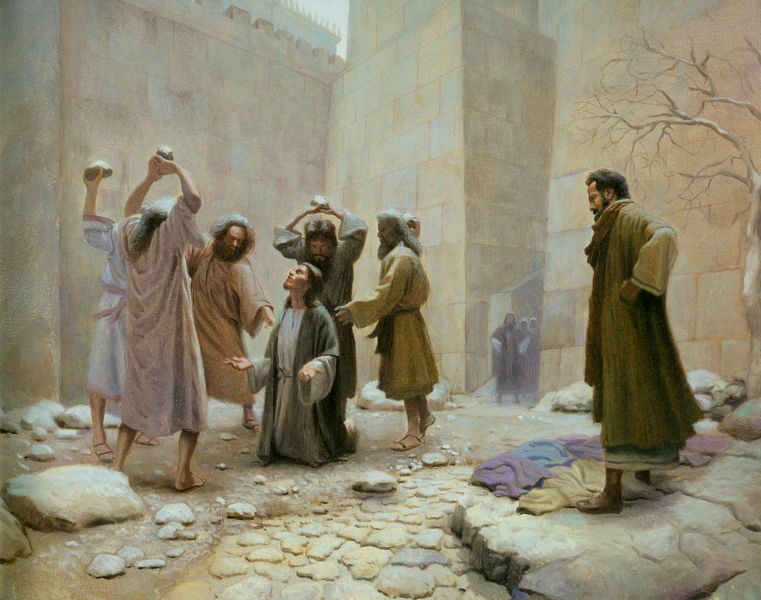
Fear arose among the believers throughout Jerusalem - fear for their lives. The fear grew so intense to where believers were uprooting themselves from their homes to move to other regions of Judea and Samaria to where they felt safe. Basically, the only ones who stayed in Jerusalem were the apostles.
Its interesting to note that Jesus' last words to His apostles were to go to Jerusalem, Judea, Samaria and the utter most parts of the earth to spread the Kingdom of God, and it was the apostles who still remained in Jerusalem. Because of persecution, all others scattered.
Arrests and Imprisonment in Jerusalem
3 As for Saul, he made havoc of the church, entering every house, and dragging off men and women, committing them to prison.
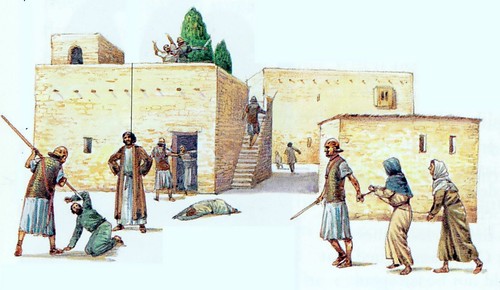
Saul, a disciple under Gamaliel the great Pharisee, obviously was given authority by his superiors in the Sanhedrin Council to drag both men and women believers off to prison. For women to be arrested, the Sanhedrin Council had to believe that any follower of Jesus, the One whom they crucified, to be a serious offense. Normally, only men were arrested.
Part of the duties of the Sadducees and Pharisees were to go about the city looking for those who would oppose the Torah and the writings of the prophets. One of their main targets were these followers of Jesus who had were now known as a group called "the Way."
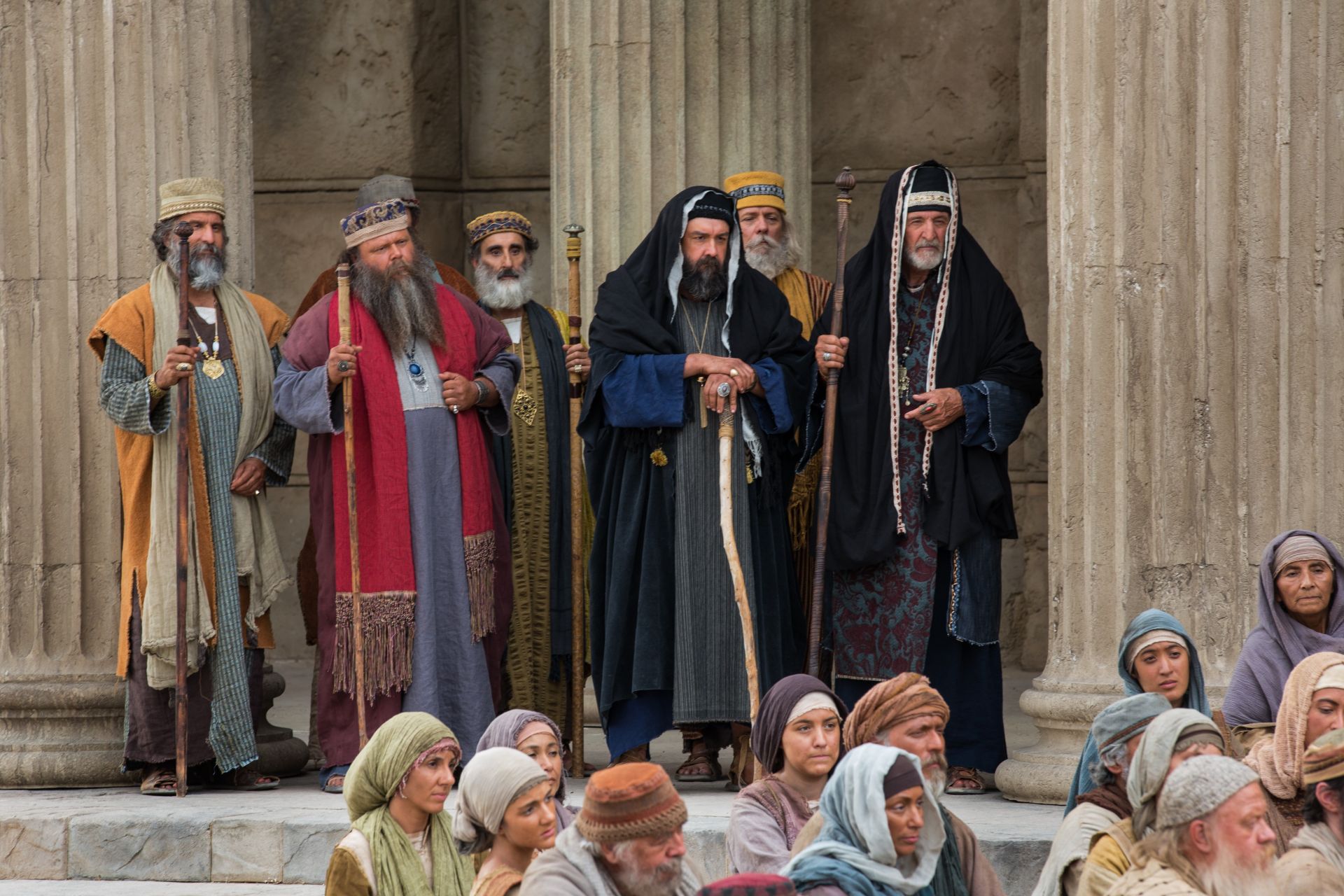
Saul, as an eager young Pharisee in training, probably trying to impress the Sanhedrin Council, was now willing to go around the city arresting the very ones the Sanhedrin Council had been spying on. In their weariness of trying to rid themselves of these believers in Jesus, the Council may have given their blessing to the arrests of any followers of Jesus to stop this movement that had been spreading like wild-fire throughout Jerusalem. As such, many Christians were arrested and even flogged.
Saul knew the Law well because he had spent his life in religious training. He had a love for God; however, it was misguided by his heavy indoctrination into the Mosaic Law and his refusal to accept Jesus as the true Jewish Messiah. In his eagerness to impress the Sanhedrin Council, he thought he was doing the Lord's work with his zealousness to rid Israel of these followers of Jesus.
Hatred Between the Jews and the Samaritans

In 722 B.C., the Assyrians had conquered the area of Israel (northern), deporting all the wealthy and middle-class Jews, leaving only the lower-poor class of people to wander around in poverty throughout Israel. Then the Assyrians brought in lower classes of pagan people from other lands into northern Israel to which they intermarried. From these poorer classes of people from Israel and others in poverty from pagan countries came the Samaritan people, and the nation of former northern Israel became known as Samaria.

Generally speaking, the Jews of the 1st century A.D., hated the Samaritans believing them to be compromising half-breeds who corrupted the worship of the true God and over-ran and took over what was once northern Israel. This prejudice between the Jews and the Samaritans began when the Jews of the Babylonian captivity came back to Jerusalem, which was in Judea, to rebuild their temple and their nation. By this time, Samaria was now a idol-worshiping nation unto themselves. This hatred grew and the strong prejudices were deep-seated as time approached the 1st century A.D.
Philip Preached in Samaria
4 Therefore those who were scattered went everywhere preaching the word. 5 Then Philip went DOWN (from Jerusalem on top of Mt. Zion) to the city of Samaria and preached Christ to them. 6 And the multitudes with one accord heeded the things spoken by Philip, hearing and seeing the miracles which he did. 7 For unclean spirits, crying with a loud voice, came out of many who were possessed; and many who were paralyzed and lame were healed. 8 And there was great joy in that city.
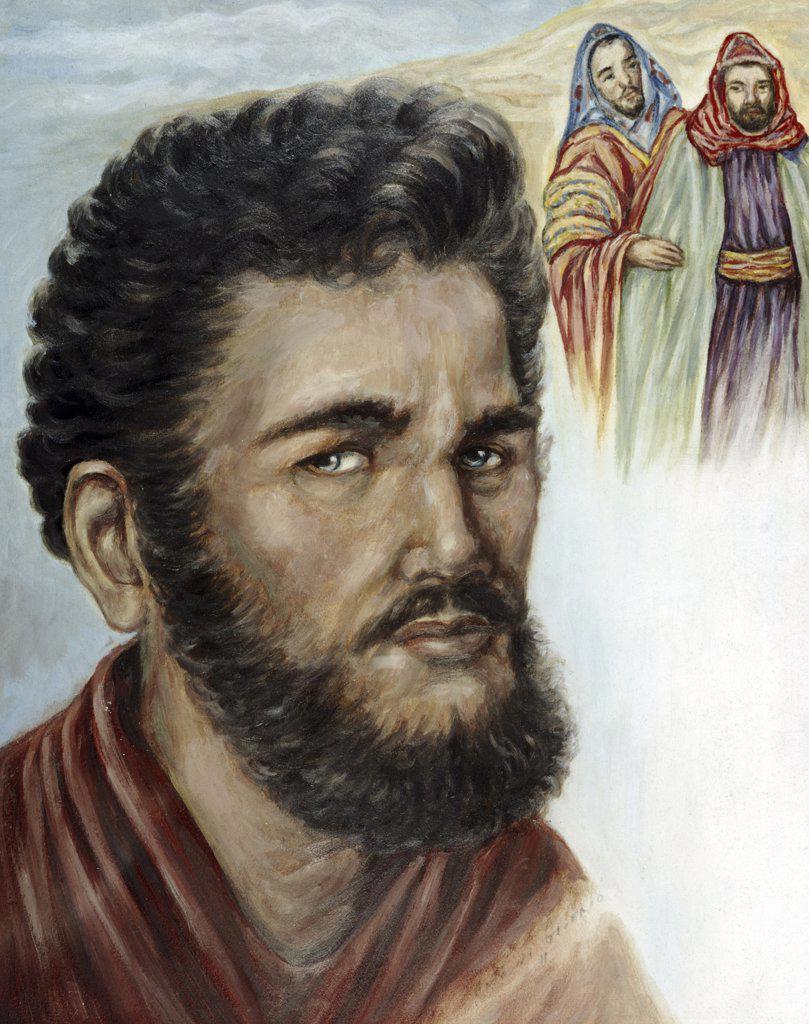
Philip the Deacon became known as Philip the Evangelist
Those believers who fled Jerusalem went to safe areas outside of Jerusalem, some going to Samaria - the hated nation among Judean Jews. Even in an idolatrous nation, they did not stop preaching Jesus and the Kingdom of God. Philip, one of the seven deacons appointed to serve in the Church (as was pointed out in chapter 6), also went to the capital city of Samaria in the country of Samaria to preach Jesus.
- Did Philip go in fear like all the others Jews who were under persecution, or could it be he was directed by the Holy Spirit? But then, maybe he was sent by the apostles to assist the scattered Jews in their journeys. While the Word does not say, other scriptures lead us to think Philip was sent by the apostles to assist the scrattering believers in their faith as they traveled to Samaria to avoid further persecution.
Philip in Samaria
Multitudes of Samaritans listened and watched as Philip the deacon boldly preached the Gospel, laid hands on people for healing and displayed many miracles. In addition, Philip commanded unclean spirits to come out of those who were possessed. The unclean spirits, however, did not give up without a fight, screaming all the way out, but because the power of God was on Philip, they had to come out. Philip also laid hands on or spoke healing over those who were paralyzed and lame and they were healed. As a result, there was great joy in that city because of what God was doing through Philip.
Simon the Sorcerer
9 But there was a certain man called Simon, who previously practiced sorcery in the city and astonished the people of Samaria, claiming that he was someone great, 10 to whom they all gave heed, from the least to the greatest, saying, “This man is the great power of God.” 11 And they heeded him because he had astonished them with his sorceries for a long time.
Simon the Sorcerer, sometimes referred to as Simon Magus, had been practicing sorcery in the city of Samaria for a long time with great success. He was looked upon as someone great wherever he traveled by practicing his sorcery, not only because Simon gave recognition to himself, but because of his many miracles, done with such great power. As such, the people believed he came from God.
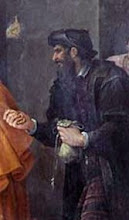
Sorcery, common in the 1st century, was strongly condemned by God (Deut 18:9-13) as acts of Satan to discredit the power of God.
12 But when they believed Philip as he preached the things concerning the kingdom of God and the name of Jesus Christ, both men and women were baptized. 13 Then Simon himself also believed; and when he was baptized he continued with Philip, and was amazed, seeing the miracles and signs which were done.

All eyes now had come upon Philip as he preached Jesus and the Kingdom of God, displaying many miracles and signs. As such, many men and women came to believe in Jesus, choosing to openly proclaim their faith by being baptized in water. Even Simon the Sorceror was amazed at all that Peter did in the name of the Lord and declared he too believed in Jesus, choosing to be baptized in water with the rest of the people. He continued to follow Philip wherever he ministered, examining the miracles and signs in which he performed so he could repeat it in his sorcery business.
Simon the Sorcerer's Sin
14 Now when the apostles who were at Jerusalem heard that Samaria had received the word of God, they sent Peter and John to them, 15 who, when they had come down, prayed for them that they might receive the Holy Spirit. 16 For as yet He had fallen upon none of them. They had only been baptized in the name of the Lord Jesus. 17 Then they laid hands on them, and they received the Holy Spirit.
Word got back to the apostles (probably through a traveling messenger) in Jerusalem of how God was using Phillip in Samaria to reach the people for the Kingdom of God. While many of the people came to believe in Jesus as their Savior and were baptized in water, they had not received the baptism of the Holy Spirit, with the evidence of speaking in tongues. Apparently Philip did not minister that blessing to the Samaritan people. Why? The Bible does not say!
When Peter and John arrived from Jerusalem, they laid hands on these new believers in Samaria, and immediately they received the gift of the Holy Spirit, as in Pentecost, being baptized in the Holy Spirit with the evidence of speaking in tongues.
18 And when Simon saw that through the laying on of the apostles’ hands the Holy Spirit was given, he offered them money, 19 saying, “Give me this power also, that anyone on whom I lay hands may receive the Holy Spirit.”
Simon saw the results of Peter and John laying hands on the new believers. As the new believers spoke in other tongues, Simon desired to have that powerful gift so he too could lay hands on other people in his sorcery business to receive that gift as well. His motive, however, was not of God. He simply wanted more power for his sorcery business. He so desired this gift to where he offered the apostles money to receive it, saying - "Give me this power too, so I can lay hands on people to receive this gift."

20 But Peter said to him, “Your money perish with you, because you thought that the gift of God could be purchased with money! 21 You have neither part nor portion in this matter, for your heart is not right in the sight of God. 22 Repent therefore of this your wickedness, and pray God if perhaps the thought of your heart may be forgiven you. 23 For I see that you are poisoned by bitterness and bound by iniquity.”
The Apostle Peter was appalled at this request from Simon. So much to where Peter, in a rebuking manner, shouted back to him - "your money perish with you." Peter went on to tell Sim the Sorcerer that this gift of God is free - it does not come with a price tag. It belongs only to those who seek God with a true heart in all He has for them. Peter shouted out, "You have no part in this gift because you are bound in sin - filled with bitterness in your heart." Wow, what a statement! Peter then insisted that Simon Magus repent so God could forgive him.
24 Then Simon answered and said, “Pray to the Lord for me, that none of the things which you have spoken may come upon me.”
Simon responded by asking Peter to pray that none of those things which he spoke of would come upon him.
- Did Simon repent of his greediness in wanting that gift from God so that he could use that power in his sorcery business? The Bible says nothing about that. What happened to Simon after this - the Bible is silent. Some say Simon repented, others says he did not. Because the Bible is silent, we will leave it at we don't know.
25 So when they had testified and preached the word of the Lord, they returned to Jerusalem, preaching the gospel in many villages of the Samaritans.
When Peter and John were done ministering the baptism of the Holy Spirit to the people, they left the city and headed back to Jerusalem. On the way home they stopped in many villages along the way to preach the Gospel of Jesus Christ to the Samaritan people.
The Gospel Comes to an Ethiopian Eunich
26 Now an angel of the Lord spoke to Philip, saying, “Arise and go toward the south along the road which goes down from Jerusalem to Gaza.” This is desert.
27 So he arose and went. And behold, a man of Ethiopia, a eunuch of great authority under Candace the queen of the Ethiopians, who had charge of all her treasury, and had come to Jerusalem to worship, 28 was returning. And sitting in his chariot, he was reading Isaiah the prophet. 29 Then the Spirit said to Philip, “Go near and overtake this chariot.”
By godly design, this elite eunich from Ethiopia who had charge over all the treasury of Candace the Queen of the Ethiopians, had been to Jerusalem to worship God and was traveling along this desert road when Philip, also by godly design, happened to see his cart stopped with the eunich reading the scriptures from his scroll
.jpg)
Ethiopia once was much larger than modern-day Ethiopia - the land where the Queen of Sheba came to see King Solomon, later professing faith in the God of Israel. It is possible that her Jewish faith was passed down through the centuries to the servants of the the proceeding queens.
.
30 So Philip ran to him, and heard him reading the prophet Isaiah, and said, “Do you understand what you are reading?” 31 And he said, “How can I, unless someone guides me?” And he asked Philip to come up and sit with him.
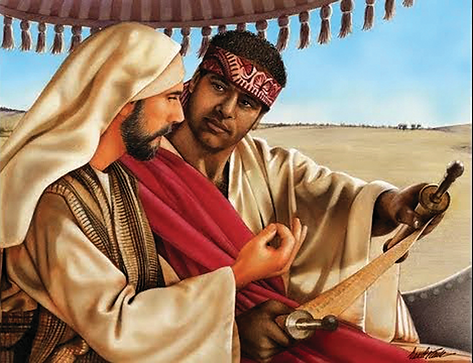
It is so wonderful, even today, when a witnessing opportunity comes out of nowhere where we know without a shadow of doubt, it was directed by God.
32 The place in the Scripture which he read was this: “He was led as a sheep to the slaughter; And as a lamb before its shearer is silent, So He opened not His mouth. 33 In His humiliation His justice was taken away, And who will declare His generation? For His life is taken from the earth.”
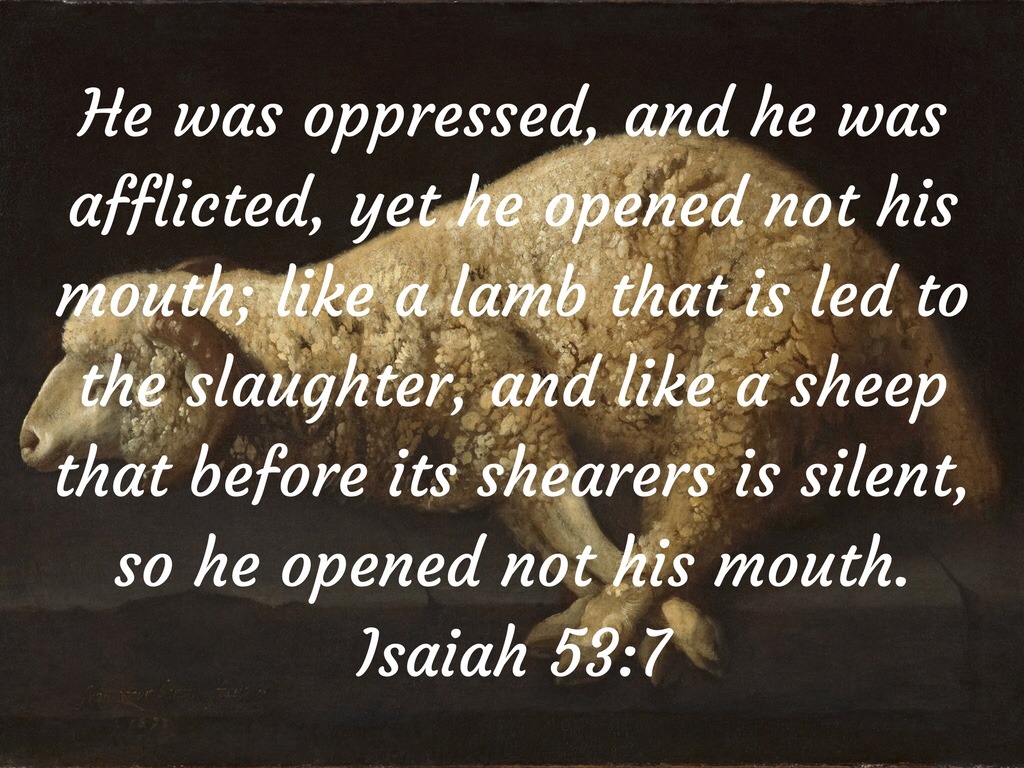
The eunich had been reading from Isaiah 53 which described the sacrificial sin-bearing work of the Messiah to come, but was having difficulty understanding what it meant
34 So the eunuch answered Philip and said, “I ask you, of whom does the prophet say this, of himself or of some other man?”
Philip began with the common ground of Jewish understanding of this Scripture, and worked his way to bring out Jesus as the Messiah, crucified, died, buried, and was resurrected.
35 Then Philip opened his mouth, and beginning at this Scripture, preached Jesus to him.
Philip began teaching the eunich about the true Messiah, and how He is the Son of God Who came to earth to bring mankind back into right relationship with God. In doing so, Jesus suffered crucifixion on the cross for the sins of man, just as was read in Isaiah, chapter 53. As Philip continued to show Jesus as the Son of God and how the Kingdom of God lives within, Philip also taught the eunich the importance of baptism in water to proclaim that faith and enter into a newness of life in Christ.
36 Now as they went down the road, they came to some water. And the eunuch said, “See, here is water. What hinders me from being baptized?”
The eunich spotted some water and immediately pointed out that he needed be baptized right now.

37 Then Philip said, “If you believe with all your heart, you may.” And he answered and said, “I believe that Jesus Christ is the Son of God.” 38 So he commanded the chariot to stand still. And both Philip and the eunuch went down into the water, and he baptized him.
The eunich's faith was genuine, and he desired to be baptized as a declaration of his faith and to then enter into that newness of life in Christ Jesus (2 Cor 5:17).
39 Now when they came up out of the water, the Spirit of the Lord caught Philip away, so that the eunuch saw him no more; and he went on his way rejoicing. 40 But Philip was found at Azotus. And passing through, he preached in all the cities till he came to Caesarea.
As we wind down this chapter we find another miracle had taken place. While the eunich was under the water and being brought up, Philip suddenly disappeared. In other words, he was caught up and God transported him to another place - a town at Azotus. From there he preached in all the cities until he came to Caesarea, as God had led him.
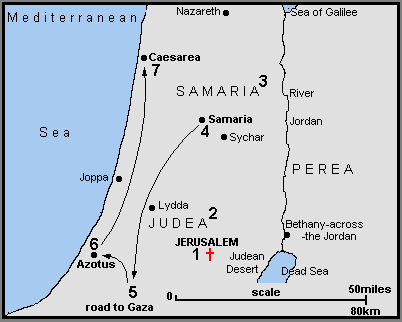
The eunich then went on his way rejoicing!
Lessons Learned From This Chapter
This has been an awesome chapter on how God seeks to use His people to accomplish His purpose upon the earth.

Saul had the best religious education, deceived, religious and obeying his religious leaders.
- A person can be religious, but on his or her way to hell.
- A person can go and be active in a church and still go to hell.
- God does not seek religious people, but humble believers who want a growing relationship/fellowship with Him - all centered on Jesus.
Philip the evangelist preached the saving knowledge of Jesus with many signs and wonders - giving God the glory. Simon the sorcerer pretended to become a believer to possess the gifts only to receive glory for himself.
- God uses humble believers to bring the lost to Jesus.
- God uses His humble believers to perform signs and wonders as tools for evangelism.
- God uses His humble believers to bring other believers into the Baptism of the Holy Spirit.
Never do we use the gifts of the Holy Spirit for our own self glorification, but to give all glory to the Lord.
Philip was walking on a desert road and saw an Ethopian eunich sitting in a chariot reading the Scriptures. The Holy Spirit spoke to Philip to go to him and question him on his reading, and he obeyed.
- It was a divine encounter that Philip met the Ethopian eunich. God also gives us divine encounters as well.
- The Holy Spirit spoke to Philip to go talk to the eunich and Philip obeyed the voice of God. When the Holy Spirit speaks to us, we too must obey.
- The Holy Spirit anointed Philip what to say to the eunich. When the Holy Spirit gives us an assignment to speak to someone, He also anoints us as to what to speak.
- God provided the water for the eunich to be baptized in. God also gives us the provision as needed in any situation when we follow His leading.
When we are in relationship and fellowship with the Lord, He can use us mightily for His plans and purposes. He seeks His humble and obedience children to accomplish mighty signs and wonders, bringing many people to Christ. All he asks is for us to be humble and obedient to His leading.

So ends chapter 8.
Click here for Acts - Chapter 9
God bless!
Pastor Joyce Erickson
Believersbibleschool.com







